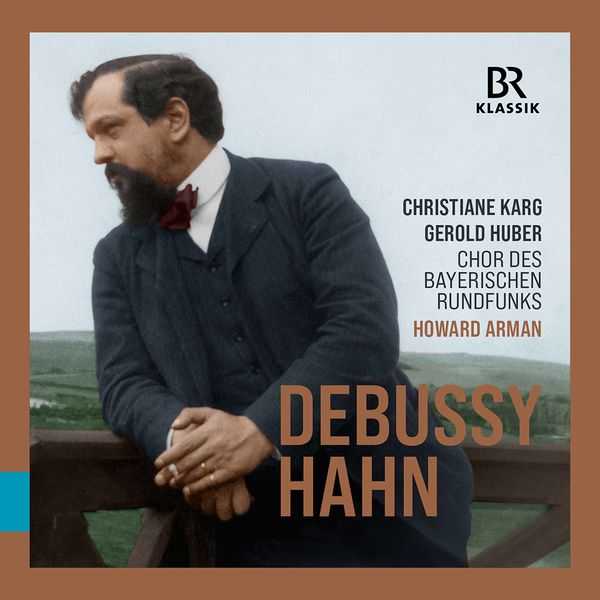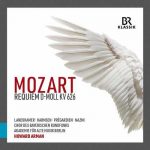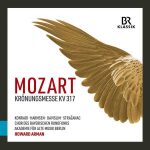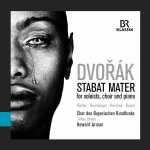

Composer: Claude Achille Debussy, Reynaldo Hahn
Performer: Christiane Karg, Gerold Huber, Angela Brower, Max Hanft, Tareq Nazmi, Anna Maria Palii, Daniel Behle, Nikolaus Pfannkuch, Chor des Bayerischen Rundfunks
Conductor: Howard Arman
Format: FLAC (tracks)
Label: BR Klassik
Catalogue: 900529
Release: 2022
Size: 519 MB
Recovery: +3%
Scan: yes
01. Debussy: Salut Printemps, L. 24
Debussy: La Damoiselle élue
02. Prélude
03 .La damoiselle élue s’appuyait
04. Je voudrais qu’il fut déjà près de moi
05. La lumière tressaillit de son côté
06. Debussy: Les angélus, L. 76
Debussy: Ariettes Oubliées
07. No. 3, L’ombre des arbres
Hahn: Chansons grises
08. No. 6, Paysage triste
Hahn: Etudes Latines
09. No. 1, Lydie
10. No. 2, Néère
11. No. 3, Salinum
12. No. 4, Thaliarque
13. No. 5, Lydé
14. No. 6, Vile potabis
15. No. 7, Tyndaris
16. No. 8, Pholoé
17. No. 9, Phidylé
18. No. 10, Phyllis
Weightless, floating sounds, far removed from any earthbound striving for a home key and eluding any measurable emphases; a dazzlingly bright play of colors in instrumentation and impressionist tones, combined with that affectionate, softly melodic character of the French language – that is what constitutes the special charm of the French art-song. Audibly very different from the German Lied of the Romantic and Late Romantic periods, its extremes are filled with tensions and delightful contrasts. In the concert repertoire on the German side of the Rhine, however, French solo and choral songs have remained something exotic.
This selection of the finest examples from the oeuvre of both brilliant composers, written at the turn of the 19th and 20th centuries, offers music full of grace and impressionistic esprit that remains unique in the history of composition and art. The cantata La Damoiselle élue was the first major success of the young Claude Debussy; appreciated for its beauty and tenderness, it is heard here for the first time in Howard Arman’s version with two pianos, based equally on the orchestral score and Debussy’s own, independent piano version. It is joined by several of Debussy’s solo and choral songs.
L’ombre des arbres dans la rivière embrumée, the poem by the symbolist lyricist Paul Verlaine, also hinges equally between Debussy and Hahn: it was masterfully set to music by both within a brief time period. The solo songs are performed by renowned soprano Christiane Karg, accompanied by Gerold Huber on the piano.
In his song and choral cycle Études latines, Reynaldo Hahn resurrected antiquity. Recreating such music not only gave the composer inspiration but also great freedom. The piano accompaniment is restrained as far as possible. These serious and tender songs reflect on the life journeys taken by a person.
The album includes Debussy’s cantata La Damoiselle élue and Reynaldo Hahn’s song and choral cycle Études latines, as well as several other masterful solo and choral songs by both composers. Weightless, floating sounds, far removed from any earthbound striving for a home key and eluding any measurable emphases; a dazzlingly bright play of colours in instrumentation and impressionist tones, combined with that affectionate, softly melodic character of the French language – that is what constitutes the special charm of the French art-song. Audibly very different from the German Lied of the Romantic and Late Romantic periods, its extremes are filled with tensions and delightful contrasts. In the concert repertoire on the German side of the Rhine, however, French solo and choral songs have remained something exotic – despite their charm, and despite the masterful compositions of Claude Debussy, Reynaldo Hahn and others. This selection of the finest examples from the oeuvre of both brilliant composers, written at the turn of the 19th and 20th centuries, offers music full of grace and impressionistic esprit that remains unique in the history of composition and art. The cantata La Damoiselle élue was the first major success of the young Claude Debussy; appreciated for its beauty and tenderness, it is heard here for the first time in Howard Arman’s version with two pianos, based equally on the orchestral score and Debussy’s own, independent piano version. It is joined by several of Debussy’s solo and choral songs. ‘L’ombre des arbres dans la rivière embrumée’, the poem by the symbolist lyricist Paul Verlaine, also hinges equally between Debussy and Hahn: it was masterfully set to music by both within a brief time period. The solo songs are performed by renowned soprano Christiane Karg, accompanied by Gerold Huber on the piano. In his song and choral cycle Études latines, Reynaldo Hahn resurrected antiquity – that is, the romantically transfigured antiquity that was imagined at the time. Recreating such music not only gave the composer inspiration – in his recourse to ancient keys or musical instruments, for instance, including shepherd’s flutes, pan pipes and lyres – but also great freedom. The piano accompaniment is restrained as far as possible. These serious and tender songs reflect on the life journeys taken by a person. After their final sounds have faded, no more words are needed, and no more questions remain unanswered.



